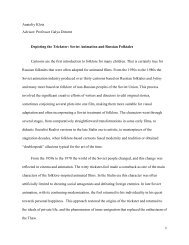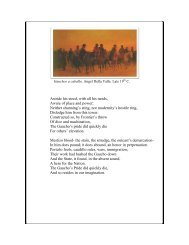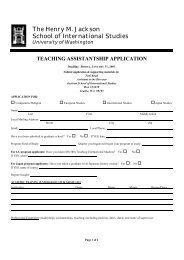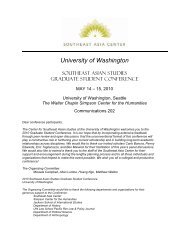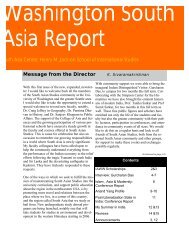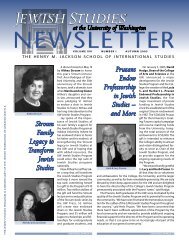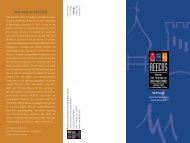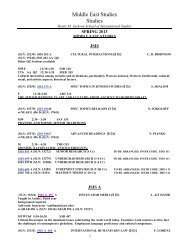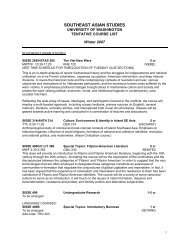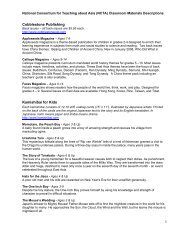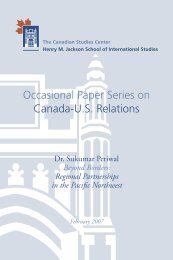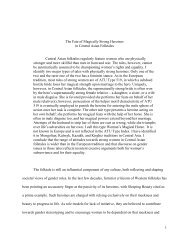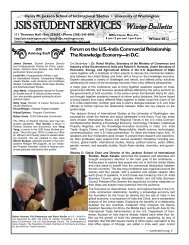jewish studies jewish studies - Jackson School of International ...
jewish studies jewish studies - Jackson School of International ...
jewish studies jewish studies - Jackson School of International ...
Create successful ePaper yourself
Turn your PDF publications into a flip-book with our unique Google optimized e-Paper software.
THE JEWISH STUDIES PROGRAM IS A BENEFICIARY<br />
OF THE JEWISH FEDERATION OF GREATER SEATTLE.<br />
JEWISH JEWISH STUDIES STUDIES<br />
at the University <strong>of</strong> Washington<br />
NEWSLETTER<br />
VOLUME XIV, NUMBER 1 AUTUMN 2003<br />
THE HENRY M. JACKSON SCHOOL OF INTERNATIONAL STUDIES<br />
NEW CHAIR OF JEWISH STUDIES<br />
Pr<strong>of</strong>essor Paul Burstein<br />
Dr. Anand Yang, director <strong>of</strong> the Henry<br />
M. <strong>Jackson</strong> <strong>School</strong> <strong>of</strong> <strong>International</strong> Studies,<br />
is pleased to announce the appointment<br />
<strong>of</strong> Pr<strong>of</strong>essor Paul Burstein as chair <strong>of</strong> the<br />
Jewish Studies Program, effective immediately.<br />
Pr<strong>of</strong>essor Burstein, a pr<strong>of</strong>essor <strong>of</strong><br />
sociology and adjunct pr<strong>of</strong>essor <strong>of</strong> political<br />
science at the UW, has been a member<br />
<strong>of</strong> the Jewish Studies faculty since 1987.<br />
He received his B.A. in sociology from<br />
the University <strong>of</strong> Chicago (1968), and his<br />
M.A. (1971) and Ph.D. (1974) in sociology<br />
from Harvard, where he wrote his doctoral dissertation<br />
on “Social Structure and Politics in Israel.”<br />
Much <strong>of</strong> Burstein’s research focuses on discrimination,<br />
particularly in employment. His work on discrimination<br />
on the basis <strong>of</strong> religion, “Religious Pluralism, Equal Opportunity,<br />
and the State,” was supported by the American<br />
Jewish Committee. Locally, he served on the committees<br />
at the Jewish Federation <strong>of</strong> Greater Seattle that planned<br />
and oversaw the 1990 and 2000 demographic surveys <strong>of</strong><br />
the Jewish population around Puget Sound.<br />
This past spring quarter, Pr<strong>of</strong>essor Burstein presented<br />
a new course, “The American Jewish Community,” in both<br />
Jewish Studies and Sociology. The course considers how<br />
life in the United States has affected the Jewish community,<br />
and how the Jewish community in turn has affected<br />
American society.<br />
Burstein says he is honored to have been asked to<br />
become chair <strong>of</strong> the Jewish Studies Program. “If the Jewish<br />
community is to flourish in the United States,” he says,<br />
“as a real community, not just a collection <strong>of</strong> individuals<br />
AUTUMN 2002 CONTENTS<br />
From the Chair ...................................... 1<br />
Year in Review ....................................... 1<br />
Visiting Committee ............................... 2<br />
Program Faculty .................................... 3<br />
Faculty News ................................... 3-4-5<br />
Visiting Faculty ...................................... 5<br />
Migdal New President <strong>of</strong> AIS ............... 5<br />
Paul Burstein<br />
YEAR IN REVIEW<br />
Where to Find Jewish Studies Courses 5<br />
Stroum Lectureship ............................ 6-7<br />
Sokol<strong>of</strong>f New Stroum Chair .................. 7<br />
Braun New Hazel D. Cole Fellow ......... 8<br />
Israel Studies and New Courses ........... 8<br />
Scholarships .......................................... 9<br />
who happen to be Jewish, it is critical that<br />
Jews understand themselves. And if the<br />
Jewish community is to matter in the<br />
larger society, it is critical that non-Jews<br />
be provided the opportunity to learn<br />
about it as well. The Jewish Studies Program<br />
at the UW, through its faculty’s<br />
teaching and research, seeks to further<br />
such learning and understanding.”<br />
Burstein’s wife, Florence, is an employee<br />
benefits consultant and President<br />
<strong>of</strong> the Board <strong>of</strong> Trustees <strong>of</strong> the Jewish Day<br />
<strong>School</strong>, where the youngest <strong>of</strong> their three<br />
children is an eighth-grader; their two<br />
older children are college students.<br />
With growing course <strong>of</strong>ferings and stimulating community<br />
education outreach, the past year has been a time<br />
<strong>of</strong> exciting challenges for the Jewish Studies Program. We<br />
will look increasingly to the Friends <strong>of</strong> the Jewish Studies<br />
Program in order to maintain and grow the Program.<br />
Among the most inspiring accomplishments <strong>of</strong> our<br />
28th year, we can point to the appointment <strong>of</strong> Pr<strong>of</strong>essor<br />
Naomi Sokol<strong>of</strong>f as the new Samuel and Althea Stroum<br />
Chair in Jewish Studies. As holder <strong>of</strong> this distinguished<br />
Chair for three years, Pr<strong>of</strong>essor Sokol<strong>of</strong>f, an expert on<br />
modern Jewish literature, will present a series <strong>of</strong> public<br />
and campus lectures.<br />
The Jewish Studies Program has enjoyed increasing<br />
CONTINUED ON PAGE 2<br />
New Courses ......................................... 9<br />
A Portrait from the Archives .............. 10<br />
Where are They Now? ........................ 10<br />
Developing a Relationship with JS ..... 11<br />
Donors ................................................. 11<br />
Courses in Jewish Studies 2003–2004 12
2<br />
“YEAR IN REVIEW” CONTINUED FROM PAGE 1<br />
interest in our American Jewish Studies area <strong>of</strong> concentration,<br />
and looks forward with excitement to<br />
the coming year. Thanks to the generosity <strong>of</strong> the<br />
late Samuel Stroum and Althea Stroum, we expect<br />
to launch a nationwide search for the new Samuel<br />
and Althea Stroum Assistant Pr<strong>of</strong>essor in Jewish<br />
Studies, whose world will focus on the study <strong>of</strong><br />
Jews in the United States.<br />
The appointment <strong>of</strong> Marina Rustow to the<br />
2002–2003 Hazel D. Cole Fellow enhanced our<br />
course <strong>of</strong>ferings and public programming concerning<br />
Jews and Arabs and Medieval Jewish<br />
History. We congratulate her on her postdoc at the<br />
Center for Advanced Jewish Studies in Philadelphia<br />
and her appointment as assistant pr<strong>of</strong>essor at Emory<br />
University in the Department <strong>of</strong> History beginning<br />
in the fall <strong>of</strong> 2003. For the coming year we are fortunate<br />
to welcome Alisa Braun from the University<br />
<strong>of</strong> Michigan who will teach a course and deliver<br />
public lectures on Yiddish Culture in America.<br />
Thanks to the generosity and hard work <strong>of</strong> the<br />
Jewish Studies Visiting Committee together with<br />
Rochelle Roseman, Jewish Studies Program Development<br />
and Outreach Coordinator, the Program<br />
was able to <strong>of</strong>fer two newly created scholarships<br />
for excellent students with a serious ongoing<br />
Kathie Friedman<br />
THE JEWISH STUDIES VISITING COMMITTEE BECOMES A TEAM<br />
The Jewish Studies<br />
Visiting Committee first<br />
came together, formally,<br />
in November<br />
2002. Since then, it has<br />
begun to share its enthusiasm<br />
and interest<br />
in Jewish Studies to connect<br />
the Program with<br />
the greater Seattle<br />
Jewish community for<br />
mutual benefit. The<br />
committee has been<br />
working to bring increased<br />
awareness,<br />
understanding and<br />
appreciation <strong>of</strong> the<br />
achievements <strong>of</strong> the<br />
Jewish Studies Program.<br />
One important objective<br />
<strong>of</strong> the committee<br />
is to foster an understanding<br />
<strong>of</strong> the value the Program <strong>of</strong>fers the region with its<br />
comprehensive examination <strong>of</strong> all aspects <strong>of</strong> Jewish experience.<br />
Another is to raise public awareness in the broader<br />
community <strong>of</strong> the research and teaching excellence <strong>of</strong> the<br />
Program scholars and to encourage alliances that make use<br />
<strong>of</strong> these talents.<br />
A major objective <strong>of</strong> the committee, also, is to contribute<br />
to the Jewish Studies Program’s fundraising efforts through<br />
personal contributions and donor cultivation.<br />
Rochelle Roseman<br />
“…I wish to thank all<br />
the Friends <strong>of</strong> Jewish<br />
Studies upon whom we<br />
depend so heavily for<br />
financial support and<br />
for links to the broader<br />
community. …(and) the<br />
outstanding faculty…<br />
for tireless donations <strong>of</strong><br />
their time both to the<br />
Program and to the<br />
community….”<br />
interest in Jewish Studies. The Jewish Studies Program<br />
is fortunate to have a dedicated Visiting<br />
Committee, which has become an important<br />
force behind the Program’s development campaign.<br />
It will continue to be key to its success.<br />
With its help, we intend to establish two endowed<br />
scholarships in Jewish Studies to ensure future<br />
opportunities for outstanding students.<br />
The 2002–2003 academic year was my final<br />
year as Chair <strong>of</strong> the Program, and in closing I wish<br />
to thank all the Friends <strong>of</strong> Jewish Studies upon<br />
whom we depend so heavily for financial support<br />
and for links to the broader community.<br />
I especially want to express my gratitude to the<br />
outstanding faculty in Jewish Studies over the past<br />
two years for tireless donations <strong>of</strong> their time both<br />
to the Program and to the community in terms<br />
<strong>of</strong> developing many new courses and delivering<br />
countless public lectures.<br />
With the beginning <strong>of</strong> the new academic year<br />
and the new Jewish year, I would like to extend<br />
my greetings to our students, alumni, faculty,<br />
colleagues, and friends with hopes for a year <strong>of</strong><br />
growing wisdom and peace to all.<br />
~ Kathie Friedman<br />
former Chair Jewish Studies<br />
An example <strong>of</strong> its<br />
success has been the<br />
new student scholarships<br />
(see article on<br />
page 9). In a short time,<br />
the committee was able<br />
to fund the first two<br />
scholarships for this<br />
academic year. Going<br />
forward, it endeavors to<br />
continue funding them<br />
through the creation <strong>of</strong><br />
an endowment.<br />
The Program is<br />
grateful to the visiting<br />
committee and appreciates<br />
its continued<br />
support. Current members<br />
are Dorothy and<br />
Jerry Becker, Timmie<br />
Faghin, Linda Gould,<br />
Al and Jeannie Maimon,<br />
Ann Nieder, Herb and Lucy Pruzan, Betty Ann Richmond, Gil<br />
and Miriam Roth, Sam and Sue Tarica, and Ina Willner.<br />
Honorary members are Rabbi Dan Bridge and Carol Starin.<br />
Back, left to right: Timmie Faghin, Jack Faghin z”l, Sue Tarica, Ernie Michael,<br />
Gil Roth, Betty Ann Richmond, Al Maimon, Sam Tarica<br />
Center: Kathie Friedman, Linda Gould, Ina Willner, Dorothy Becker<br />
Front: Ann Neider, Miriam Roth. Not pictured: Lucy and Herb Pruzan<br />
To know more about the Jewish Studies Visiting Committee<br />
or to be a part <strong>of</strong> this special group, get in touch with<br />
Rochelle Roseman. Call 206.543.0138 or<br />
e-mail roseman@u.washington.edu
JEWISH STUDIES PROGRAM FACULTY 2003–2004<br />
Jere Bacharach, Ph.D., University <strong>of</strong> Michigan (1967);<br />
Pr<strong>of</strong>essor, History; Jews under Islam<br />
Paul Burstein, Chair, Ph.D., Harvard (1974);<br />
Pr<strong>of</strong>essor, Sociology; The American Jewish Community<br />
Joseph Butwin, Ph.D., Harvard (1971);<br />
Associate Pr<strong>of</strong>essor, English; Jews in the literature <strong>of</strong> England,<br />
Jewish American immigrant literature<br />
Julia Niebuhr Eulenberg, Ph.D., University <strong>of</strong> Washington (1996);<br />
Visiting Scholar; American Jewish history<br />
Kathie Friedman, Ph.D., State University <strong>of</strong> New York at<br />
Binghamton (1991); Associate Pr<strong>of</strong>essor, <strong>Jackson</strong> <strong>School</strong> <strong>of</strong><br />
<strong>International</strong> Studies; Adjunct, Sociology and Women Studies;<br />
comparative immigration and ethnicity, contemporary Jewish<br />
American identities; Jewish women in contemporary America<br />
Hillel Gamoran, D.H.L., Spertus College (1966);<br />
Visiting Lecturer; Rabbinic literature<br />
Susan A. Glenn, Ph.D., University <strong>of</strong> California, Berkeley (1983);<br />
Pr<strong>of</strong>essor, History; Jews and Blacks<br />
Martin S. Jaffee, Ph.D., Brown (1980); Pr<strong>of</strong>essor, <strong>Jackson</strong> <strong>School</strong><br />
<strong>of</strong> <strong>International</strong> Studies; Adjunct, Near Eastern Languages and<br />
Civilization; Post-Biblical and Rabbinic Judaism<br />
Deborah Kerdeman, Ph.D., Stanford (1991); Associate Pr<strong>of</strong>essor,<br />
Education; philosophy <strong>of</strong> education, Jewish education<br />
Levis A. Kochin, Ph.D., Chicago (1975);<br />
Associate Pr<strong>of</strong>essor, Economics; Israeli economics<br />
FACULTY NEWS<br />
Pr<strong>of</strong>essor Jere L. Bacharach served as director <strong>of</strong> the<br />
American Research Center in Egypt since mid-December,<br />
stepping down at the end <strong>of</strong> June with the appointment<br />
<strong>of</strong> a long-term ARCE director. While Pr<strong>of</strong>essor Bacharach<br />
felt safe in Egypt, family and friends in the U.S. were understandably<br />
concerned, particularly during the period <strong>of</strong><br />
the Anglo-American invasion <strong>of</strong> Iraq. As director, Pr<strong>of</strong>essor<br />
Bacharach dealt with a wide variety <strong>of</strong> Egyptians and Americans,<br />
from <strong>of</strong>ficials, ambassadors and ministers, to workmen<br />
who removed dirt from excavation sites. Last fall he<br />
presented a successful five-part series <strong>of</strong> lectures for the<br />
UW Simpson Center for the Humanities on the history and<br />
culture <strong>of</strong> the Islamic Middle East through the fifteenth<br />
century. This coming fall will be his last as a regular member<br />
<strong>of</strong> the UW faculty. He plans to retire during this coming<br />
academic year.<br />
Pr<strong>of</strong>essor Julia Niebuhr Eulenberg presented “The Young<br />
Adventurers“ at the Pacific Northwest Historians Guild conference<br />
in Seattle, WA in March 2003. Drawn from her<br />
dissertation, this paper tells the story <strong>of</strong> Washington<br />
Territory’s young Jewish men and women entrepreneurs<br />
who, with an adventurous spirit and against the backdrop<br />
<strong>of</strong> a raw new territory, capably created business models<br />
that differed from those seen elsewhere in America. It also<br />
acknowledges the contributions they made to the growth<br />
<strong>of</strong> what would become Washington State’s many Jewish<br />
communities.<br />
Pr<strong>of</strong>essor Kathie Friedman served as the chair <strong>of</strong> the Jewish<br />
Studies Program for the past two academic years. She,<br />
along with Pr<strong>of</strong>essor Katharyne Mitchell (Geography), has<br />
been awarded a Curriculum Transformation Grant, which<br />
will focus on The Comparative Diaspora. It is the first <strong>of</strong> its<br />
kind to be granted for Jewish Studies. Pr<strong>of</strong>essor Friedman<br />
Joel S. Migdal, Ph.D., Harvard (1972);<br />
Pr<strong>of</strong>essor, <strong>Jackson</strong> <strong>School</strong> <strong>of</strong> <strong>International</strong> Studies; Adjunct,<br />
Political Science; Arabs and Jews in Israel and Palestine<br />
Scott Noegel, Ph.D., Cornell (1995);<br />
Associate Pr<strong>of</strong>essor, <strong>Jackson</strong> <strong>School</strong> <strong>of</strong> <strong>International</strong> Studies<br />
and Near Eastern Languages and Civilization; Hebrew Bible,<br />
Near Eastern languages and literature<br />
Michael A. Rosenthal, Ph.D., University <strong>of</strong> Chicago (1996);<br />
Associate Pr<strong>of</strong>essor, philosophy; Spinoza and Jewish<br />
Philosophy<br />
Naomi B. Sokol<strong>of</strong>f, Ph.D., Princeton (1980); Pr<strong>of</strong>essor, Near<br />
Eastern Languages and Civilization; Adjunct, Women Studies;<br />
Hebrew language and literature; The Holocaust and Literature<br />
Robert Stacey, Ph.D., Yale (1983);<br />
Pr<strong>of</strong>essor, History; Medieval Jewish history<br />
Sarah Abrevaya Stein, Ph.D., Stanford (1999); Assistant Pr<strong>of</strong>essor,<br />
<strong>Jackson</strong> <strong>School</strong> <strong>of</strong> <strong>International</strong> Studies and History; Modern<br />
Jewish History, Eastern European Jewry; Sephardic Studies<br />
Joan Ullman, Ph.D.,Bryn Mawr (1963);<br />
Pr<strong>of</strong>essor Emeritus; History; Jews in the History <strong>of</strong> Spain<br />
Brannon Wheeler, Ph.D., University <strong>of</strong> Chicago (1993);<br />
Associate Pr<strong>of</strong>essor, Near East Languages and Civilization;<br />
Islamic Studies, History <strong>of</strong> the Study <strong>of</strong> Religion, Jewish<br />
Languages<br />
Hazel D. Cole Fellow 2003–04 Alisa Braun, University <strong>of</strong> Michigan<br />
and husband, Pr<strong>of</strong>essor Resat Kasaba, welcomed daughter,<br />
Melis, into their home in March.<br />
Pr<strong>of</strong>essor Hillel Gamoran delivered “How the Rishonim Met<br />
the Clash Between Credit Sales and the Law Against Usury”<br />
at the Jewish Law Association conference in Jerusalem. He is<br />
the editor <strong>of</strong> The Jewish Law Association Studies, Volume XIV,<br />
which covered the Jerusalem conference proceedings. His<br />
most recent publication is Talmud for Everyday Living: Insights<br />
into Buying and Selling, designed for synagogue adult education<br />
classes. In addition, he taught “Issues <strong>of</strong> Life and Death<br />
in the Talmud” at the Temple Beth Am mini-University, and<br />
spoke, along with his son Saul, at UW Hillel on “Jewish Business<br />
Ethics.” He serves as chair <strong>of</strong> the Hebrew Literacy Task<br />
Force <strong>of</strong> the Central Conference <strong>of</strong> American Rabbis.<br />
Pr<strong>of</strong>essor Martin S. Jaffee, acting chair <strong>of</strong> the Comparative<br />
Religion Program, served as a respondent to a series <strong>of</strong><br />
papers on “Orality, Literacy, and Colonialism in Antiquity” in<br />
recognition <strong>of</strong> his ongoing research in rabbinic oral tradition,<br />
and will be published in Semeia: An Experimental Journal for<br />
Biblical Criticism. Also, commissioned entries, “Discipleship”<br />
and “Oral Torah” will appear in the second edition <strong>of</strong> The<br />
Encyclopedia <strong>of</strong> Religion. Pr<strong>of</strong>essor Jaffee continues to serve on<br />
the board <strong>of</strong> editors for Religious Studies Review and the Journal<br />
<strong>of</strong> the American Academy <strong>of</strong> Religion. In January 2003, he,<br />
along with friend and colleague, Hillel Kieval (Washington<br />
University), accepted co-editorship <strong>of</strong> the AJS Review, the<br />
Association for Jewish Studies journal and leading international<br />
forum for scholarship in Judaism and Jewish civilizations.<br />
During the year, speaking engagements took him to<br />
the University <strong>of</strong> Alabama and Notre Dame. Topics included,<br />
“Self-Disclosure, Religious Studies Pedagogy, and the Skeptical<br />
CONTINUED ON PAGE 4<br />
3
4<br />
“FACULTY NEWS” CONTINUED FROM PAGE 3<br />
Mission <strong>of</strong> the Public University.” Pr<strong>of</strong>essor Jaffee augmented<br />
his range <strong>of</strong> courses with two new <strong>of</strong>ferings: NE 496 “Rabbinic<br />
Oral-Traditional Literature” and SIS 498 “Monotheism<br />
and the Political Order.” With the help <strong>of</strong> a course development<br />
grant from the <strong>International</strong> Studies Center, he designed<br />
a new course, “Antisemitism as a Cultural System” during<br />
the summer <strong>of</strong> 2003.<br />
Pr<strong>of</strong>essor Joel Migdal spent 2002–03 on sabbatical leave,<br />
during which time he was a visiting pr<strong>of</strong>essor at The <strong>School</strong> <strong>of</strong><br />
Oriental and African Studies in London and at Sciences-Pol<br />
in Paris. He also served as the<br />
Lady Davis Fellow at Hebrew<br />
University in Jerusalem. While<br />
he was away, he presented<br />
seminars in Bergen, Oslo,<br />
Stockholm, Uppsala, Istanbul,<br />
Berlin, London, Paris, and all<br />
the universities in Israel. In<br />
March 2003, the paperback<br />
edition <strong>of</strong> The Palestinian<br />
People: A History, co-authored<br />
with Baruch Kimmerling,<br />
(Harvard University Press<br />
2003) was published. Pr<strong>of</strong>essor<br />
Migdal has recently been<br />
elected president <strong>of</strong> the (<strong>International</strong>)<br />
Association for Israel<br />
Studies for a two-year term.<br />
Pr<strong>of</strong>essor Scott Noegel <strong>of</strong>fered many scholarly, university,<br />
and community lectures this year. Among them: “Word Play<br />
in the Hebrew Bible,” “Relics in the Ancient Near East,” “The<br />
Power <strong>of</strong> ‘Magic’ in Ancient Egypt,” “Shibboleths, Politics,<br />
and Literary Flare: Dialects and the Hebrew Bible,” and “The<br />
Ark <strong>of</strong> the Covenant in the Light <strong>of</strong> Ancient Egypt.” He also has<br />
been engaged in a number <strong>of</strong> publishing projects including<br />
“Dreaming and the Ideology <strong>of</strong> Mantics: Homer and Ancient<br />
Near Eastern Oneiromancy” (MELAMMU, 3; Helsinki: Neo-<br />
Assyrian Text Corpus Project), “From an Ancient Egyptian Love<br />
Lyric” (Encyclopedia <strong>of</strong> Erotic Literature), and “Mesopotamian<br />
Epic” (The Blackwell Companion to Ancient Epic). His most<br />
recent article, now in consideration by a classics journal, is<br />
entitled “Apollonius’ Argonautika and Egyptian Solar Mythology.”<br />
Noegel’s recent monograph “Nocturnal Ciphers: The<br />
Allusive Language <strong>of</strong> Dreams in the Ancient Near East” will<br />
appear later this year in the American Oriental Series (New<br />
Haven, CT). Soon to be on the shelves: Prayer, Magic, and the<br />
Stars in the Ancient and Late Antique World, co-edited with<br />
Joel Walker and Brannon Wheeler (Magic in History Series,<br />
Penn State University Press). The Linguistic Cycle: Selected Writings<br />
<strong>of</strong> Carleton T. Hodge (CDL Press), co-edited with Dr. Alan<br />
Kaye, also will appear later this year. His most current project,<br />
now in progress, is a book entitled Magic and the Bible<br />
(Routledge Press). Pr<strong>of</strong>essor Noegel completed his first term<br />
as President <strong>of</strong> the American Research Center <strong>of</strong> Egypt, Northwest<br />
Chapter, an appointment that complements his work on<br />
the “Digital Egypt” project, for which he received a University<br />
Curriculum Development Award. The “Digital Egypt” project,<br />
now under construction, will enable him to create a technology-based,<br />
co-taught course on the subject <strong>of</strong> Egypt from early<br />
antiquity to the rise <strong>of</strong> Islam.<br />
Pr<strong>of</strong>essor Michael Rosenthal, Associate<br />
Pr<strong>of</strong>essor <strong>of</strong> Philosophy, has recently<br />
joined the Jewish Studies Program faculty.<br />
Widely published, samples <strong>of</strong> his<br />
articles that will appear this year are:<br />
“Persuasive Passions:␣ Rhetoric and the<br />
Interpretation <strong>of</strong> Spinoza’s Theological-<br />
Political Treatise,” forthcoming in Archiv<br />
für Geschichte der Philosophie, volume<br />
3, 2003; and “The ‘Black, Scabby Brazilian’:<br />
Some Thoughts on Race and<br />
Early Modern Philosophy,” forthcoming Pr<strong>of</strong>essor Rosenthal<br />
in Philosophy & Social Criticism (2003).<br />
He was invited to give papers at the American Academy <strong>of</strong><br />
Religion Meeting in Toronto (November 2002) and at a conference<br />
sponsored by the University <strong>of</strong> North Carolina at<br />
Chapel Hill on “‘Light against Darkness’: An <strong>International</strong> Symposium<br />
on Dualism in Ancient Mediterranean Religion and<br />
the Contemporary World,” (June 2003). Fall 2003, Pr<strong>of</strong>essor<br />
Rosenthal will speak␣ at two symposiums organized by Jewish<br />
Studies programs: Second Shoshana Shier Symposium on<br />
Judaism and Modernity, University <strong>of</strong> Toronto, September<br />
2003; and “Philosophers and the Bible” conference, sponsored<br />
by the Joseph and Rebecca Meyerh<strong>of</strong>f Center for<br />
Jewish Studies at the University <strong>of</strong> Maryland, November 2003.<br />
He is currently working on a book tentatively titled Persuasive<br />
Passions: Spinoza and Religious Tolerance.␣ Much, though not<br />
all, <strong>of</strong> his recent work is connected to that project.<br />
Pr<strong>of</strong>essor Marina Rustow, the Hazel D. Cole Fellow for 2002–<br />
03, will be joining the faculty <strong>of</strong> History and Jewish Studies at<br />
Emory University as assistant pr<strong>of</strong>essor, beginning spring 2004.<br />
Fall term 2003, she will be a fellow at the Center for Advanced<br />
Judaic Studies at the University <strong>of</strong> Pennsylvania.<br />
Pr<strong>of</strong>essor Naomi Sokol<strong>of</strong>f, the Samuel and Althea Stroum<br />
Endowed Chair in Jewish Studies, participated in conferences<br />
at Cambridge University, “The World <strong>of</strong> Aharon Appelfeld,”<br />
where she presented a paper on multilingualism in Appelfeld’s<br />
writing and at William and Mary, where she presented a<br />
paper on “The Holocaust and the Encyclopedic Imagination”.<br />
The essays prepared for the latter will be published in a volume<br />
edited by Marc Raphael. In October 2002 she spoke on<br />
the topic, “Gail Hareven’s ‘Healing’: Translation as Theme and<br />
Challenge” at a symposium in honor <strong>of</strong> Edna Amir C<strong>of</strong>fin at<br />
Washington University. Pr<strong>of</strong>essor Sokol<strong>of</strong>f’s recent writings<br />
include an essay on Gila Almagor in Holocaust Literature,<br />
edited by S. Lillian Kremer (Routledge, 2002), as well as an<br />
essay on Aharon Appelfeld for a new volume <strong>of</strong> The Dictionary<br />
<strong>of</strong> Literary Biography (The Holocaust Novel). Her co-edited<br />
volume, Traditions and Transitions in Israel Studies: Books on<br />
Israel 6 (SUNY Press), appeared in print in December 2002.<br />
“The Jewish Presence in Children’s Literature,” a special issue<br />
<strong>of</strong> The Lion and the Unicorn (Johns Hopkins UP) edited by<br />
Suzanne Rahn and Naomi Sokol<strong>of</strong>f, is being published Autumn<br />
2003. Also appearing in print this past year: an article on<br />
Savyon Liebrecht in History and Literature (Brown Judaic Studies,<br />
2002), and an article on Agnon in Reading Hebrew Literature<br />
(University Press <strong>of</strong> New England, 2002). In addition, she<br />
gave several public lectures on Israel as part <strong>of</strong> the Limmud<br />
CONTINUED ON PAGE 5<br />
The zodiac and four seasons, from 6 th century Byzantine floor mosaic in a Galilean synagogue
“FACULTY NEWS” CONTINUED FROM PAGE 4<br />
NW program and served as Graduate Program Advisor in the<br />
Near East Department.<br />
Pr<strong>of</strong>essor Robert Stacey finished his five-year term as Chair<br />
<strong>of</strong> the History Department in July 2002. During the past year,<br />
he has been on leave, returning to his study <strong>of</strong> ritual crucifixion<br />
stories in medieval England, and preparing a revised<br />
edition <strong>of</strong> his western civilization textbook.<br />
Pr<strong>of</strong>essor Sarah Abrevaya Stein taught a new graduate<br />
course entitled “Topics in Modern European Jewish History”<br />
and, for the second time, taught an undergraduate lecture<br />
course “The Jewish Twentieth Century in Film.” During this<br />
academic year, she will co-teach three new courses, two with<br />
Dr. Uta Poiger on the history <strong>of</strong> the Holocaust. Pr<strong>of</strong>essor Stein<br />
addressed the wider Seattle community several times in<br />
recent months, including a talk given as part <strong>of</strong> the Seattle<br />
Jewish Film Festival. Her most recent work appears in the journals<br />
Pe’amim, Studies in the Cultural Heritage <strong>of</strong> Oriental Jewry<br />
and Slavic Review, and in various edited volumes, among them<br />
Boundaries and Belonging (Cambridge University Press, 2003)<br />
and The Oxford Handbook <strong>of</strong> Jewish Studies (Oxford University<br />
Press, 2002). Pr<strong>of</strong>essor Stein is currently co-editing, with Dr.<br />
Resat Kasaba, a volume entitled Coexistence and Conflict in<br />
Ottoman Society. Her book, Making Jews Modern: Yiddish and<br />
Ladino Press in the Russian and Ottoman Empires, is being published<br />
this year by Indiana University Press. She is currently at<br />
work on a new book project that explores European Jews’<br />
role in the colonization <strong>of</strong> sub Saharan Africa.<br />
Pr<strong>of</strong>essor Brannon Wheeler, with Scott Noegel and Joel<br />
Walker, edited the papers for publication, presented at the<br />
UW conference on “Prayer, Magic and the Stars” (Penn State<br />
Press). His book, Moses in the Quran and Islamic Exegesis<br />
(Curzon Routledge) was published last summer; his edited<br />
volume, Teaching Islam (Oxford), appeared in January 2003.<br />
His work appears in the published volumes <strong>of</strong> the<br />
Encyclopaedia <strong>of</strong> the Quran (E. J. Brill), the Oxford Dictionary<br />
<strong>of</strong> Islam (Oxford), and an article is forthcoming in the second<br />
edition <strong>of</strong> the Encyclopedia <strong>of</strong> Religion (Macmillan). In addition<br />
to several published articles, he contributed a paper to<br />
a conference on Islamic Law and Sufism in Murcia, Spain.<br />
Pr<strong>of</strong>essor Wheeler concludes his second three-year term as<br />
editor for Religious Studies Review, and has plans to launch a<br />
new journal in Comparative Islamic Studies to be published<br />
by Leicester University Press. He also continues work on the<br />
editing <strong>of</strong> the Dictionary <strong>of</strong> Muslim Biographies (Continuum),<br />
and his book-length manuscript on “Ritual, Relics, and Territory<br />
in Islam.” During the summer and fall 2003, he will<br />
be a Fellow at the Institute for Ismaili Studies in London, the<br />
Oxford Centre for Islamic Studies, and a visiting scholar at<br />
the <strong>School</strong> <strong>of</strong> Oriental and African Studies at the University<br />
<strong>of</strong> London. Pr<strong>of</strong>essor Wheeler received a Senior Fellowship<br />
at the American Centers for Oriental Research in Amman,<br />
Jordan for 2004, and will also be conducting research on<br />
the Arab Prophets <strong>of</strong> the Quran and Bible with a Fulbright<br />
research Fellowship in Jordan, Egypt, and Saudi Arabia during<br />
that same time. This coincides with his chairmanship <strong>of</strong><br />
a new section in the Society <strong>of</strong> Biblical Literature, “On the<br />
Quran and Biblical Literature.”<br />
Visiting Faculty<br />
The Jewish Studies Program is very pleased to have two<br />
visiting faculty for the 2003–2004 academic year. The program<br />
welcomes Hazel D. Cole Fellow, Alisa Braun (see article<br />
page 8), and Shlomo Chertok.<br />
Shlomo Chertok received an M.A. in Jewish Studies at the<br />
University <strong>of</strong> Chicago and is currently completing a Ph.D. in<br />
Jewish Thought in Modern Jewish Intellectual History at Ben-<br />
Gurion University <strong>of</strong> the Negev, Israel. In addition, he has broad<br />
training in the History <strong>of</strong> Jewish Biblical Interpretation and the<br />
Jewish Philosophical Tradition. Chertok will be teaching “The<br />
Jews in Western Civilization,” Winter 2004, and Beginning<br />
Modern Hebrew through UW Extension beginning Fall 2003.<br />
Joel Migdal Becomes President <strong>of</strong> AIS<br />
Pr<strong>of</strong>essor Joel Migdal has made<br />
the UW the center for two important<br />
undertakings.<br />
In May, he became the two-year<br />
president <strong>of</strong> the Association for<br />
Israel Studies (AIS). AIS, an international<br />
organization <strong>of</strong> academics<br />
and others researching and teaching<br />
on Israel, has members in<br />
North America, Europe, and Israel.<br />
The website is http://www.gc.cuny.<br />
edu/directories/faculty/S.htm. Pr<strong>of</strong>essor Migdal<br />
Migdal also has been appointed<br />
the first editor <strong>of</strong> a new book series, Studies on Israel,<br />
to be published by the University <strong>of</strong> Wisconsin Press.<br />
He expects the first books in the series to appear in<br />
late 2004 or 2005.<br />
How to Find UW Courses in Jewish Studies<br />
“Where do I find Jewish Studies courses?”<br />
This is a commonly asked question. Not every<br />
course related to Jewish Studies is listed under “Jewish<br />
Studies” in the time schedule. Courses in Hebrew language,<br />
Jewish History, Judaism (religion), and the Bible,<br />
for instance, are <strong>of</strong>fered through other departments<br />
and programs.<br />
The faculty members <strong>of</strong>fering these courses have,<br />
since the founding <strong>of</strong> the Jewish Studies Program,<br />
volunteered many administrative hours to coordinate<br />
the Jewish Studies curriculum. It is comprised primarily<br />
<strong>of</strong> courses in Near East Languages and Civilization,<br />
Comparative Religion, History, English and, occasionally,<br />
programs such as <strong>International</strong> Studies.<br />
Therefore, to find courses directly related to Jewish<br />
Studies, it is imperative to check the UW Time Schedule<br />
for the following rubrics: NE, HSTAM, HSTAA, RELIG,<br />
HEBR, HIST, ENGL.<br />
5
Photo courtesy Koret Institute<br />
Photograph by Kathy Sauber, © University Photography<br />
6<br />
THE 2003 SAMUEL & ALTHEA STROUM LECTURESHIP IN JEWISH STUDIES<br />
“Jewish Renewal and<br />
the American Spiritual<br />
Marketplace”: a summary<br />
This year, Chava Weissler, the Philip<br />
and Muriel Berman Pr<strong>of</strong>essor <strong>of</strong> Jewish<br />
civilization in the department <strong>of</strong> Religion<br />
Studies at Lehigh University, presented<br />
the Samuel and Althea Stroum Lectures.<br />
Her subject was “Jewish Renewal and<br />
Chava Weissler the American Spiritual Marketplace.”<br />
Weissler’s research on Jewish Renewal<br />
emerged from her book about seventeenth- and eighteenthcentury<br />
Yiddish devotional prayers, Voices <strong>of</strong> the Matriarchs:<br />
Listening to the Prayers <strong>of</strong> Early Modern Jewish Women (Boston:<br />
Beacon Press, 1998). These prayers were part <strong>of</strong> a mystical<br />
revival in Judaism in which kabbalah became central for a large<br />
mass <strong>of</strong> Jewish people, both men and women, for the first<br />
Chava Weissler, Rochelle Roseman and Althea Stroum<br />
share greetings during the reception after the lecture.<br />
time in history. After completing this book, Weissler turned to<br />
the popularization <strong>of</strong> kabbalah in contemporary American religion<br />
and set out to understand its appeal for Jews today,<br />
women in particular. For the purposes <strong>of</strong> fieldwork, Weissler<br />
looked for a community that sought to make the esoteric teachings<br />
<strong>of</strong> kabbalah broadly available to anyone interested. She<br />
landed upon the Jewish Renewal movement, which draws upon<br />
kabbalah as one <strong>of</strong> its sources and regards women and men as<br />
equal partners in Jewish life. Her main focus was Aleph: The<br />
Alliance for Jewish Renewal, a network <strong>of</strong> groups with roots in<br />
neo-Hasidism, 1960s counterculture, the ecological and feminist<br />
movements, and eastern philosophies.<br />
Aleph describes itself as trans-denominational, seeking to<br />
infuse the established four denominations (Reform,<br />
Reconstructionist, Conservative, and Orthodox) with an experiential<br />
relationship with the sacred. Rabbis associated with<br />
Renewal have been ordained by each <strong>of</strong> these four movements.<br />
But, Weissler argued in her first lecture, sociologically Renewal<br />
looks like a denomination. To explain this, she invoked the<br />
sociologist <strong>of</strong> religion Wade Clark Ro<strong>of</strong>, who describes an American<br />
“spiritual marketplace” in which the texts <strong>of</strong> nearly every<br />
religious tradition are widely accessible in book shops in English<br />
translations. ”We live in a commodity culture,” Weissler<br />
explained, “and consumption is our main means <strong>of</strong> selfexpression.”<br />
␣ And yet this is paradoxical since spirituality and<br />
consumerism might also be seen as opposed. But Renewal fulfills<br />
market demands for a certain type <strong>of</strong> Judaism, she argued,<br />
and in that sense, the structure <strong>of</strong> the American marketplace<br />
has converted a “trans-denominational” spiritual movement<br />
into one that behaves institutionally like a denomination.<br />
Weissler went on to outline seven characteristic features <strong>of</strong><br />
Renewal: the quest for an experiential relationship with God;<br />
a commitment to gender equality; an approach to Jewish traditions<br />
(particularly hasidic and mystical ones) as resources<br />
rather than inflexible obligations; openness to the spiritual<br />
resources <strong>of</strong> other religious traditions; reliance upon charismatic<br />
leadership, in which the rabbi is a vehicle for closeness to God<br />
CONTINUED ON PAGE 2<br />
Photograph by Kathy Sauber, © University Photography
SAMUEL & ALTHEA STROUM ANNUAL LECTURE SERIES ~ APRIL 14, 19 & 21, 2004<br />
Pr<strong>of</strong>essor Susan Handelman will present “Find Yourself a Teacher:<br />
The Mentor-Disciple Relation in Jewish Thought<br />
and Contemporary Cultural Studies”<br />
Susan A. Handelman, Pr<strong>of</strong>essor <strong>of</strong><br />
English at Bar-Ilan University, Israel, will<br />
deliver the 2004 Samuel and Althea<br />
Stroum Lectures. Her topic is “Find<br />
Yourself a Teacher: The Mentor-Disciple<br />
Relation in Jewish Thought and Con-<br />
Susan Handelman temporary Cultural Studies.” The<br />
lectures will take place in Kane Hall 220,<br />
beginning at 7:30 PM each evening.<br />
Pr<strong>of</strong>essor Handelman is a teacher extraordinaire, named<br />
a “Top Ten” teacher at College Park (Diamondback student<br />
newspaper) and “Teacher <strong>of</strong> the Year” (University <strong>of</strong> Maryland<br />
Panhellenic Association). She received the Distinguished<br />
Scholar-Teacher Award 1989–1990 (University <strong>of</strong> Maryland).<br />
Pr<strong>of</strong>essor Handelman has been a pr<strong>of</strong>essor <strong>of</strong> English at<br />
the University <strong>of</strong> Maryland and a visiting pr<strong>of</strong>essor at the<br />
“WEISSLER” CONTINUED FROM PAGE 6<br />
(a feature it shares with Hasidism); use <strong>of</strong> the language <strong>of</strong> therapeutic<br />
culture and acceptance <strong>of</strong> the centrality <strong>of</strong> the individual<br />
in her spiritual and psychological path; and a commitment to<br />
social justice and a left-liberal political stance.<br />
In her second lecture, Weissler observed that the preponderant<br />
majority <strong>of</strong> Renewal’s members (although only about<br />
half <strong>of</strong> its leaders) are women. This reflects what historians<br />
call the “feminization <strong>of</strong> American religion” since the nineteenth<br />
century: as religion has become associated with the<br />
private domain, women have come to predominate in American<br />
religious life. Judaism’s public rituals, by contrast, have<br />
historically been dominated by men. Because men have more<br />
options for Jewish life than women, they may also feel they<br />
have more to lose by affiliating with Renewal. Moreover,<br />
Renewal is explicit about using feminist and gender-neutral<br />
God-language. Since the imagery and language the Western<br />
traditions use for God reflect and reinforce certain types <strong>of</strong><br />
social structures and hierarchies — God was called “King” in<br />
biblical times because kings were the most honored and powerful<br />
members <strong>of</strong> society; God was called Father because<br />
fathers are the heads <strong>of</strong> the household — feminist theology<br />
argues for non-hierarchical God-language and a democratic<br />
social organization. Renewal Jews therefore also turn to<br />
kabbalah and its feminine imagery for the Divine.<br />
In her third lecture, Weissler described the way Renewal<br />
transforms the kabbalistic notion <strong>of</strong> the Four Worlds from a<br />
theory <strong>of</strong> the cosmos to a teaching about the nature <strong>of</strong> the<br />
self. In the fourteenth century, kabbalists invoked the concept<br />
in order to bridge the gap between a transcendent divine and<br />
the world <strong>of</strong> multiplicity and pain. Later, Lurianic kabbalah identified<br />
the four worlds with states <strong>of</strong> meditation at stages <strong>of</strong> the<br />
liturgy, as the mystical adept strove to draw near to the<br />
Godhead. In Hasidism, the doctrine became identified with<br />
inner aspects <strong>of</strong> the psyche, in keeping with Hasidism’s tendency<br />
to psychologize kabbalistic cosmology. Jewish Renewal<br />
even further “psychologized” the four worlds by interpreting<br />
them as aspects <strong>of</strong> human existence. Many renewal liturgies,<br />
Institute for Jewish Studies, Hebrew University in Jerusalem.<br />
At the graduate level she has taught at the Interdisciplinary<br />
Program in Gender Studies: Core Course in Gender in Language<br />
and Literature, Literary Theory, and Critical Thought<br />
and The Teaching <strong>of</strong> Literature. She has taught courses on<br />
The Old Testament and Literary Criticism, Reading the Bible:<br />
Problems <strong>of</strong> Interpretation, American-Jewish Literature,<br />
Women in Jewish Literature, and Literature and Ethics.<br />
Her primary research interest is literary criticism and Jewish<br />
<strong>studies</strong>, especially the relation <strong>of</strong> literature to the<br />
philosophy <strong>of</strong> religion.<br />
Pr<strong>of</strong>essor Naomi Sokol<strong>of</strong>f Awarded<br />
the Samuel and Althea Stroum<br />
Chair in Jewish Studies<br />
At the pinnacle <strong>of</strong> university recognition<br />
<strong>of</strong> faculty excellence is the<br />
position <strong>of</strong> endowed chair. These<br />
positions publicly acknowledge<br />
superior scholarship, and reward<br />
the best faculty at the university.<br />
In 1985, through the extraordinary<br />
generosity <strong>of</strong> Samuel and Althea<br />
Stroum, the only endowed chair<br />
at the <strong>Jackson</strong> <strong>School</strong> was established.<br />
It remains one <strong>of</strong> only three<br />
endowed chairs in the entire Col- Naomi Sokol<strong>of</strong>f<br />
lege <strong>of</strong> Arts and Sciences.<br />
This year, the Stroum Chair has been awarded to<br />
Naomi Sokol<strong>of</strong>f, Pr<strong>of</strong>essor <strong>of</strong> Near Eastern Languages<br />
and Civilization, Women’s Studies, Hebrew<br />
Language and Literature, and The Holocaust. She will<br />
hold the chair for three years, using the resources<br />
provided by the chair to support her research and<br />
her program at UW. In return, she will give public<br />
talks and present a colloquium during winter quarter<br />
2004. Other planning is in process.<br />
for example, interpret the Sabbath morning liturgy as a “spiritual<br />
journey.” Instead <strong>of</strong> focusing on the divine end <strong>of</strong> the<br />
equation, Renewal emphasizes the self, answering the questions<br />
who am I, what is my place in the cosmos, and how can<br />
I encounter the Infinite?<br />
Renewal’s transformation <strong>of</strong> the Jewish mystical tradition,<br />
Weissler argued, should be understood both as part <strong>of</strong> a broad<br />
set <strong>of</strong> changes in American religious life and as an extension <strong>of</strong><br />
the development <strong>of</strong> Jewish mystical thought. In that sense,<br />
Renewal has attempted to create a “Jewish language” in which<br />
to express and shape contemporary American spirituality.<br />
~ Marina Rustow<br />
HAZEL D. COLE FELLOW, 2002–2003<br />
7
8<br />
NEW HAZEL D. COLE FELLOW ARRIVES FROM THE UNIVERSITY OF MICHIGAN<br />
Alisa Braun<br />
This year, the Jewish Studies Program<br />
welcomes Alisa Braun as the Hazel D.<br />
Cole Fellow for 2003–2004. She earned<br />
her MA (1997) and is earning her Ph.D.<br />
from the University <strong>of</strong> Michigan in<br />
American and British Fiction (1870–<br />
1920) with a specialized inquiry in<br />
Jewish Cultural Studies.<br />
Her graduate thesis, “Jews,<br />
Writing, and the Dynamics<br />
<strong>of</strong> Literary Affiliation<br />
1890–1940,” challenges<br />
notions <strong>of</strong> literary author-<br />
ity by exploring how writers, traditionally seen<br />
as involved in relations <strong>of</strong> patronage or<br />
mentorship, worked in tandem to construct their<br />
identities as authors and to legitimize their own<br />
aesthetic and ideological projects. Ms. Braun<br />
At the graduate level, the University <strong>of</strong> Washington has<br />
become one <strong>of</strong> a handful <strong>of</strong> North American centers training<br />
a new generation <strong>of</strong> scholars who specialize on Israel.<br />
Several graduates have taken posts at other universities.<br />
Niall Omurchu, Ph.D. (2000) wrote his dissertation on religious<br />
and ethnic struggles in Northern Ireland and Palestine under<br />
British rule. He now teaches at Western Washington University.<br />
Specializing on Israel’s High Court <strong>of</strong> Justice, Patricia Woods,<br />
Ph.D. (2001) took a post in the University <strong>of</strong> Florida’s (Gainseville)<br />
departments <strong>of</strong> Jewish Studies and Political Science.<br />
Two doctoral students are now in the final stages <strong>of</strong> their<br />
graduate training. Maha el-Taji is completing research in the<br />
Haifa area on politics in Arab villages and the relationship to<br />
the High Court <strong>of</strong> Justice. Roni Amit is writing on the adoption<br />
<strong>of</strong> international human rights law by Israeli (and several<br />
other countries’) supreme courts.<br />
A Turkish graduate student, Yuksel Sezgin, is about to start<br />
his field research for his dissertation on the role <strong>of</strong> religious<br />
courts in Israel, Egypt, and India. A graduate student at the<br />
University <strong>of</strong> Oslo, writing on the Shas Party, has applied to<br />
be a visiting graduate student here next year, to learn more<br />
about Israel. Several other students, early in their graduate<br />
careers, plan to concentrate on Israel <strong>studies</strong>, as well.<br />
As these students’ topics make clear, the opportunity to<br />
study Israel in comparative perspective is a prime draw <strong>of</strong> the<br />
University <strong>of</strong> Washington.<br />
The Hazel D. Cole Fellowship<br />
was established in 1992 by<br />
Althea Stroum and her late<br />
husband, Samuel, to provide<br />
financial assistance to<br />
deserving doctoral or<br />
postdoctoral fellows in Jewish<br />
Studies, and to honor the<br />
memory <strong>of</strong> Mrs. Stroum’s<br />
sister, Hazel D. Cole.<br />
focuses on the careers <strong>of</strong> Jewish writers as they emerged on<br />
the American scene, questioning traditional models <strong>of</strong> the relation<br />
between ethnicity and hierarchy in the writing pr<strong>of</strong>ession.<br />
She received a Dissertation Research Fellowship from the<br />
Center for Jewish History, the Rose and Isidore Drench Fellowship<br />
from the YIVO Institute <strong>of</strong> Jewish Research, and many<br />
awards and prizes from such organizations as the Institute for<br />
Courses on Israel<br />
Research on Women and Gender, the Marshall<br />
Weinberg Prize <strong>of</strong> Excellence in Judaic Studies,<br />
the Mellon Dissertation Fellowship and the Lurie<br />
Award for Excellence in Teaching. Ms. Braun<br />
earned her undergraduate degree from Columbia<br />
University and attended the Ureil Weinreich<br />
Program in Yiddish Literature and Culture in 1998<br />
and 2000 at Columbia.<br />
Fall quarter 2003, she will teach SISJE 490<br />
Yiddish Culture in America (English Translations),<br />
Tuesdays and Thursdays, 1:30–3:20.<br />
THE HAZEL D. COLE FELLOWSHIP IN JEWISH STUDIES SEEKS APPLICANTS<br />
The Jewish Studies Program at the University <strong>of</strong> Washington is<br />
welcoming applications for the Hazel D. Cole Fellowship in<br />
Jewish Studies for the academic year 2004–2005.<br />
The Fellowship may be used for either doctoral or post-doctoral<br />
research in any field <strong>of</strong> Jewish Studies.␣ Candidates must agree<br />
to be in residence at the University <strong>of</strong> Washington for the tenure<br />
<strong>of</strong> the fellowship.␣ The Hazel D. Cole Fellow will receive a stipend<br />
<strong>of</strong> approximately $30,000, pending funding for the academic<br />
year. The successful candidate will take part in the ongoing Jewish<br />
Studies Colloquium Series, and will <strong>of</strong>fer one undergraduate<br />
seminar or lecture course during the academic year.<br />
Applicants from all American and foreign universities are welcome.<br />
ISRAEL STUDIES: A CENTRAL FOCUS OF JEWISH STUDIES<br />
Applications to consist <strong>of</strong>:<br />
(1) A current curriculum vitae<br />
(2) A description (not exceeding five pages)<br />
<strong>of</strong> the proposed research proposal<br />
(3) Three letters <strong>of</strong> recommendation<br />
ALL APPLICATIONS (including letters <strong>of</strong> recommendation) MUST<br />
BE RECEIVED NO LATER THAN NOVEMBER 14, 2003.<br />
MAIL application materials to:<br />
(Applications by fax or e-mail will not be accepted.)<br />
Hazel D. Cole Fellowship Search Committee<br />
JSIS, University <strong>of</strong> Washington<br />
Box 353650, Seattle, WA 98195-3650<br />
RECENT INTRODUCTIONS TO THE CURRICULUM<br />
NEW: Israeli Identities<br />
(Winter, NE 326/CHID 498, Sokol<strong>of</strong>f)<br />
Explores fiction, film, poetry, songs and essays<br />
about diverse groups within contemporary<br />
Israeli society.<br />
NEW: Foreign Policy Towards Israel<br />
(Winter, SIS 495, Wellman)<br />
Modern Jewish Literature and Cultural Identity<br />
Yiddish Culture in America<br />
(Fall, SISJE 490, Braun)<br />
American Jewish Community<br />
(Winter, SISJE 377, Burstein)<br />
Topics in Ethnicity and Cultural Identity:<br />
Eastern European Jewish Literature<br />
(Winter, RUSS 424/SISJE 490A, Henry)<br />
Jewish Women in Contemporary America<br />
(Spring, SISJE 438, Friedman)<br />
For complete course descriptions:<br />
http://jsis.artsci.washington.edu/programs/<strong>jewish</strong>/courses.html<br />
or call (206) 543-4243<br />
Scenic photograph by Mary Levin, © University Photography
VISITING COMMITTEE CREATES SCHOLARSHIPS<br />
Two new scholarships<br />
have been created by the<br />
Jewish Studies Visiting<br />
Committee to encourage<br />
and recognize outstanding<br />
students who have a<br />
desire to include courses<br />
in Jewish Studies as part<br />
<strong>of</strong> their overall academic<br />
plans.<br />
Now funding the<br />
scholarships on an annual<br />
basis, the Visiting Committee<br />
hopes to soon<br />
endow them permanently.<br />
By doing so, it<br />
hopes to attract deserving<br />
and talented students to<br />
Jewish Studies for many<br />
years to come.<br />
The first two scholarships were<br />
awarded for 2003–2004 to Karen<br />
Rosenberg and Anna Polyakovsky at a<br />
reception held in their honor this past<br />
June. In attendance were members <strong>of</strong><br />
the Visiting Committee, Dr. Anand<br />
Yang, Director <strong>of</strong> the <strong>Jackson</strong> <strong>School</strong>,<br />
Jewish Studies faculty and staff.<br />
Karen Rosenberg, a doctoral student<br />
in Women’s Studies, is interested in pursuing<br />
research and teaching in Jewish Karen Rosenberg Anna Polyakovsky<br />
NEW COURSES FOR 2003–2004<br />
Reception for Jewish Studies Visiting Committee Scholarship winners<br />
Standing l-r: Al Maimon, Pr<strong>of</strong>. Paul Burstein, Pr<strong>of</strong>. Jere Bacharach, Anna Polyakovsky,<br />
Karen Rosenberg, Dr. Anand Yang, Linda Gould, Pr<strong>of</strong>. Joel Migdal, Pr<strong>of</strong>. Naomi Sokol<strong>of</strong>f<br />
Seated l-r: Lucy Pruzan, Gil Roth, Timmie Faghin, Miriam Roth<br />
Rich, new course <strong>of</strong>ferings in Jewish Studies have been<br />
developed by pr<strong>of</strong>essors Naomi Sokol<strong>of</strong>f, Martin Jaffee and<br />
James Wellman. Included are Hebrew Language and Literature,<br />
and Cultural Identity, as it pertains to the Jewish<br />
Community.<br />
Beginning Modern Hebrew Course<br />
Demand for Modern Hebrew has been growing in recent<br />
years, and the Near East Department has had to turn away<br />
many students from its morning language classes. Now there<br />
will be a new option to learn Israeli (Modern) Hebrew. Starting<br />
Fall Quarter 2003, Modern Hebrew will now be <strong>of</strong>fered in<br />
an evening class through UW Extension. Beginning Modern<br />
Hebrew (HEBR 404) will cover the same material as the daytime<br />
<strong>of</strong>fering (Elementary Modern Hebrew, HEBR 411), but<br />
at a less accelerated pace. Students will earn 3 credits per<br />
quarter rather than 5. The textbook, Ivrit min ha-hathalah<br />
he-hadash, Level I, was developed for Ulpan classes at the Hebrew<br />
University <strong>of</strong> Jerusalem and has been adopted widely at<br />
universities throughout the U.S. The instructor, Shlomo<br />
Chertok, received an M.A. in Jewish Studies at the University<br />
<strong>of</strong> Chicago and is currently completing a Ph.D. in Jewish<br />
Thought at Ben-Gurion University. To register, call UW Extension<br />
at 206-543-2320 in the greater Seattle area, or<br />
1-800-543-2320. Going forward, Intensive Hebrew will also<br />
be <strong>of</strong>fered during the summer. In 2003, the summer course<br />
was taught by Aliza Sandalon and teaching assistant, David<br />
9<br />
Women’s Studies. Inspired<br />
by Pr<strong>of</strong>essor Kathie<br />
Friedman’s course, “Jewish<br />
Women in Contemporary<br />
America”, she began to<br />
think seriously about issues<br />
<strong>of</strong> how Jewish<br />
female identities are constructed<br />
in contemporary<br />
American society. The<br />
scholarship will allow her<br />
to continue her research<br />
and coursework in a more<br />
rigorous and meaningful<br />
way.<br />
Anna Polyakovsky is a<br />
junior majoring in biochemistry,<br />
with a minor<br />
in Jewish Studies. Her first<br />
academic interest in Jewish Studies<br />
began with taking Pr<strong>of</strong>essor Martin<br />
Jaffee’s course, “Intro to Judaism”,<br />
where she quickly learned having a bat<br />
mitzvah did not automatically translate<br />
into a foundation <strong>of</strong> knowledge about<br />
Judaism. Fascinated with what she was<br />
learning, she decided to make Jewish<br />
Studies her minor. The scholarship will<br />
allow her to continue her pursuit <strong>of</strong><br />
Jewish knowledge while she completes<br />
her <strong>studies</strong> in biochemistry.<br />
Walker. If you have questions about the curriculum, or about<br />
what level <strong>of</strong> Hebrew language study is best for you, contact<br />
Pr<strong>of</strong>essor Naomi Sokol<strong>of</strong>f at 206-543-7145.<br />
Hebrew Poems and Prayers<br />
HEBR 456. It will be <strong>of</strong>fered MWF 11:30–12:20.<br />
Prerequisite: HEBR 423 or permission <strong>of</strong> instructor.<br />
Pr<strong>of</strong>essor Naomi Sokol<strong>of</strong>f will <strong>of</strong>fer a new course on Hebrew<br />
Poems and Prayers beginning fall quarter 2003. The course<br />
examines modern Hebrew poems side by side with texts from<br />
the traditional Jewish liturgy, and will analyze how contemporary<br />
writers have drawn on classical sources to reflect on<br />
matters <strong>of</strong> faith and the language <strong>of</strong> religion. The poems have<br />
an unusual allusive richness, because <strong>of</strong> the history <strong>of</strong> the<br />
Hebrew language — an ancient, sacred tongue that has been<br />
renewed and revitalized in the past 55 years as a modern,<br />
secular vernacular. Understanding contemporary Hebrew<br />
poetry requires familiarity with the language <strong>of</strong> Jewish prayers.<br />
This class presents to students some outstanding modern writers<br />
while also fostering appreciation for the many historical<br />
layers <strong>of</strong> the Hebrew language. In addition, the course provides<br />
advanced work in Hebrew, <strong>of</strong>fering students an opportunity<br />
to improve grammar, diction, and composition skills.<br />
For complete course descriptions go to:<br />
http://jsis.artsci.washington.edu/programs/<strong>jewish</strong>/courses.html<br />
or call (206) 543-4243
10<br />
WHERE ARE THEY NOW?<br />
Over the years, thousands <strong>of</strong> UW students have taken Jewish<br />
Studies courses, and many <strong>of</strong> their lives have been affected<br />
by their Jewish Studies experience.<br />
Dorothy Becker, B.A./B.S. College <strong>of</strong> Arts and Sciences<br />
(General Studies) major in Jewish Studies 1979, began her<br />
<strong>studies</strong> at UW after high school in 1948, then took the next<br />
29 years <strong>of</strong>f to marry and raise a family. In 1977, her college<br />
student daughter, Arlene, urged her<br />
take the “Introduction to Judaism”<br />
course with Deborah Lipschadt and she<br />
was hooked. Two years later, she became<br />
one <strong>of</strong> the first Jewish Studies majors<br />
to graduate from UW. An active<br />
volunteer for years in many Jewish<br />
community organizations and a founding<br />
member and past president <strong>of</strong> Congregation<br />
Beth Shalom, she and<br />
husband, Jerry, are now retired and live<br />
half <strong>of</strong> each year in Seattle and Palm<br />
Springs, CA.<br />
Keith Pickus, M.A. Modern German<br />
History 1988, Ph. D. Modern European<br />
Jewish History 1993, joined the faculty<br />
at Wichita State University in 1995 as<br />
Assistant Pr<strong>of</strong>essor <strong>of</strong> modern German<br />
Jewish History; he was promoted to<br />
Associate Pr<strong>of</strong>essor in 2001. Pr<strong>of</strong>essor<br />
Pickus also served as graduate program<br />
coordinator for the history deptartment<br />
before moving to the Dean’s <strong>of</strong>fice in<br />
2001, where he is currently Associate<br />
Dean. His research focuses on the topic<br />
<strong>of</strong> religious minorities in 19th century<br />
Germany. His monograph, Constructing Modern Identities:<br />
Jewish University Students in Germany, 1815–1914, was published<br />
in 1999 by Wayne State University Press.<br />
Julie Katz, B.A. Art History, B.S. Nursing 1988, M.Ed. and<br />
B.Lit. (Hebrew) at University <strong>of</strong> Judaism Los Angeles 1992, a<br />
Seattle native raised in a traditional Jewish home, found the<br />
Jewish Studies Program helped her to mature in Jewish learning<br />
and to gain a broader world perspective in a stimulating<br />
academic environment. After living in Israel for two years and<br />
attending graduate school, she returned to Seattle as director<br />
<strong>of</strong> education at Congregation Beth Shalom until 1996. She<br />
left to work for the <strong>School</strong> <strong>of</strong> Nursing at UW where she is now<br />
the Assistant Dean. Katz continues to serve as a resource in<br />
the Jewish community.<br />
Peter Drury, B.A. Jewish Studies 1989, M.S.W in Child<br />
and Family Therapy at University <strong>of</strong> Illinois, Master <strong>of</strong> Divinity<br />
at Yale Divinity <strong>School</strong>. He was ordained into the Christian<br />
ministry in 1993 and has served as pastor <strong>of</strong> the recently<br />
merged All Pilgrims Christian Church in Seattle since 1997.<br />
Pastor Drury’s special interests include helping people discern<br />
their sense <strong>of</strong> call in the world; strategic planning; and biblical<br />
study in which the Bible is looked at seriously, not literally.<br />
He has long felt the Jewish Studies Program helped greatly to<br />
create a foundation for his future educational and spiritual<br />
growth.<br />
“Family Portrait” JHP-Adelson, June #2, MSCUA<br />
University <strong>of</strong> Washington Libraries, Negative #18800<br />
Galit S. Ezekiel, B.A. Business Administration 1990, was<br />
born in Israel and spoke fluent Hebrew and English by the<br />
time the family moved to the US when she was six. Over the<br />
years, her Hebrew lapsed, but when she planned to spend her<br />
junior year studying in Israel, she enrolled in Modern Hebrew<br />
classes with Pr<strong>of</strong>essor Naomi Sokol<strong>of</strong>f. Upon her return, she<br />
became actively involved with Hillel and AIPAC, and always<br />
felt she would connect, pr<strong>of</strong>essionally, with the Jewish community.<br />
After several years as a pr<strong>of</strong>essional<br />
fundraiser, she is, today, Director<br />
<strong>of</strong> Development for Hillel at the UW.<br />
Michael Weingrad, B.A. Yale, M.A.<br />
English 1993 UW, Ph.D. English 1999<br />
UW, is currently the Montague Burton<br />
Fellow in Jewish Studies at the University<br />
<strong>of</strong> Leeds, UK. Pr<strong>of</strong>essor Weingrad<br />
teaches courses in modern Jewish literature,<br />
modern Jewish thought, Jewish history<br />
and Jewish-American literature and<br />
Culture. He is currently working on a<br />
book on American Jewish poetry, which<br />
will include <strong>studies</strong> <strong>of</strong> Hebrew poetry in<br />
America and <strong>of</strong> American poets writing<br />
in Israel. Weingrad has been a Fulbright<br />
Fellow Hebrew University in Jerusalem<br />
and a research fellow at the Leo Baeck<br />
Institute in New York City.<br />
Jacob Fenton, B.A. Business Administration<br />
(Marketing and Entrepreneurship)<br />
2001, with a Jewish Studies minor,<br />
found the Jewish Studies Program became<br />
the driving catalyst in making<br />
such a large public university seem small<br />
and intimate. This in turn led to other Jewish affiliations and<br />
connections while at the university (Hillel student president<br />
1998–2000, AIPAC, AEPi, Jewish Federation Alliance). Fenton, now<br />
in the entertainment industry, keeps in touch with many <strong>of</strong> his<br />
pr<strong>of</strong>essors, especially Pr<strong>of</strong>essors Kathie Friedman and Naomi<br />
Sokol<strong>of</strong>f. They and others still serve as great resources for his<br />
continuing Jewish education. He resides in Los Angeles, CA.<br />
New Research Fund in Jewish Studies<br />
Through the generosity <strong>of</strong> Seattle Jewish community<br />
member Andy Krasnow, a research fund has been<br />
set up for faculty and advanced graduate students<br />
in the Jewish Studies Program. These funds will<br />
subsidize costs related to the conduct <strong>of</strong> research,<br />
the presentation and dissemination <strong>of</strong> research,<br />
and the purchase <strong>of</strong> special equipment<br />
for a particular Jewish Studies project.<br />
The Jewish Studies Program greatly<br />
appreciates Krasnow’s commitment<br />
to building and sustaining world-class<br />
scholarship in Judaism and Jewish lives<br />
today and throughout history, here<br />
at the University <strong>of</strong> Washington.<br />
Scenic photograph by Mary Levin, © University Photography
BE A FRIEND OF JEWISH STUDIES!<br />
Enclosed is my gift <strong>of</strong><br />
$1000 $500<br />
$250 $100<br />
Other $______________<br />
I am interested in discussing<br />
a more substantial gift to<br />
the Jewish Studies Program at<br />
the University <strong>of</strong> Washington.<br />
Please contact me at:<br />
HOME<br />
or OFFICE<br />
Pursuant to RCW/19.09, the University<br />
<strong>of</strong> Washington is registered as a charitable<br />
organization with the Secretary <strong>of</strong> State,<br />
State <strong>of</strong> Washington. For information,<br />
call the Office <strong>of</strong> the Secretary <strong>of</strong> State<br />
1-800-332-4483<br />
(source code: MJESTD98.JESTDI)<br />
The Jewish Studies Program in the University <strong>of</strong><br />
Washington’s Henry M. <strong>Jackson</strong> <strong>School</strong> <strong>of</strong> <strong>International</strong> Studies<br />
is the premier program in the Northwest for the academic<br />
study <strong>of</strong> Jewish life in a variety <strong>of</strong> international settings. Working<br />
together in the Jewish Studies Program, pr<strong>of</strong>essors <strong>of</strong><br />
history, sociology, political science, literary criticism, economics,<br />
language, philosophy, religion, and American <strong>studies</strong>, bring<br />
new understandings to the forces that have shaped and the<br />
issues that confront Jews. At the University <strong>of</strong> Washington,<br />
the field <strong>of</strong> Jewish Studies takes a broad interdisciplinary and<br />
multidimensional approach to the global study <strong>of</strong> Jews.<br />
Over the years, many wonderful alumni and friends, organizations,<br />
foundations and businesses from all over the<br />
Northwest have supported the Jewish Studies Program with<br />
gifts large and small. Now, more than ever before, this support<br />
is essential. Cuts in state support have made the University <strong>of</strong><br />
Washington increasingly dependent on private giving. Supporting<br />
the program not only enriches the University community,<br />
it also benefits the greater Jewish community.<br />
The Jewish Studies Program aims to increase its community<br />
educational and cultural programming. With your help,<br />
we can interest more students in Jewish subjects, and aug-<br />
2002–2003 FRIENDS OF JEWISH STUDIES DONORS<br />
William Abramson<br />
Deloris Ament<br />
Marian Aronson<br />
Jerome & Dorothy Becker<br />
Thank<br />
Marcella Benditt<br />
you!<br />
David Benoliel<br />
Douglas Berry<br />
& Pr<strong>of</strong>. Naomi Sokol<strong>of</strong>f<br />
The Boeing Company<br />
Herbert & Shirley Bridge<br />
Janis Bridge, M.D.<br />
Rabbi Daniel Bridge<br />
Pr<strong>of</strong>. Paul & Florence Burstein<br />
Henry & Olga Butler<br />
Meta Buttnick<br />
Philip Chanen & Audry Joy Wolf<br />
Linda Jane Clifton, Ph.D.<br />
Gerald Cone & Molly Lamken<br />
Dawson Associates<br />
Dena Dawson<br />
Lilly De Jaen<br />
Benjamin Dortch<br />
Please make checks payable to Friends <strong>of</strong> Jewish Studies. Return this form to:<br />
Jewish Studies Program, Box 353650, University <strong>of</strong> Washington, Seattle, WA 98195-3650<br />
You may also call toll-free 1-877-UW-GIFTS (1-877-894-4387) to make a credit card gift.<br />
NAME<br />
ADDRESS<br />
CITY / STATE / ZIP<br />
VISA CARD # / EXP. DATE<br />
SIGNATURE (FOR VISA ONLY)<br />
My company will match this gift.<br />
I have enclosed matching gift forms.<br />
Developing a Relationship with the Jewish Studies Program<br />
Shawn Drew<br />
Arlene Ehrlich, MSW<br />
Hanna Eulenberg<br />
Excellent Women’s Book Club<br />
Timmie Raport Faghin<br />
Fidelity Investments<br />
Irene Brudie Fisher<br />
Stuart Dean Freed, M.D.<br />
Renee Fricke<br />
Hillel Gamoran<br />
The Gamoran Family Foundation<br />
Linda Joan Gould<br />
Sidney Gravitz<br />
N. Grinspan<br />
Robert Groonis<br />
Sara Groonis<br />
David E & Sharron Hartman<br />
Irene Harvitz<br />
Harry Hayward<br />
Institute <strong>of</strong> Foreign Lang,<br />
Ed, Inje Univ.<br />
Michal Jacoby<br />
11<br />
ment our participation in both the Jewish Book Month and<br />
the Seattle Film Festival. With increased funding, we can <strong>of</strong>fer<br />
special events, lecture series, and performances that will attract<br />
and appeal to Jews from a wide diversity <strong>of</strong> backgrounds.<br />
Topics such as New Jewish Music, Changing Roles <strong>of</strong> Jewish<br />
Women, Contemporary Israeli Politics and Society, and others,<br />
have the capacity to draw previously uninvolved<br />
community members, the young and not-so-young, into the<br />
Jewish Studies circle. These sorts <strong>of</strong> activities reach out to the<br />
community, connect the community to the university, and celebrate<br />
knowledge about the rich diversity <strong>of</strong> Jewish lives today<br />
and in the past.<br />
Take the opportunity, today, to be a part <strong>of</strong> the vitality <strong>of</strong><br />
Jewish Studies in the Northwest. If you are not already a “Friend<br />
<strong>of</strong> the Jewish Studies Program,” now is the time to lend us<br />
your support. Your contribution <strong>of</strong> any amount is increasingly<br />
important and will help make possible more community educational<br />
and cultural programs, more Jewish student outreach,<br />
and additional academic innovations. It’s easy to help. Just fill<br />
in and cut out the coupon found in this newsletter, and mail it<br />
and your donation to the address shown. Thank you very much<br />
for your support.<br />
Alice Kaderlan-Halsey<br />
Aileen Kelly<br />
Andrew Krasnow<br />
Bess Leavitt<br />
Sam Levinson<br />
Albert & Jean Maimon<br />
Marsh & Mclennan Companies, Inc.<br />
Boris Masinovsky, Ph.D.<br />
Pamela R. Miller<br />
Jeremy H. Miller Archirects<br />
Jeremy Miller & Barbara Mack<strong>of</strong>f<br />
Cheryl Nations<br />
Ann L. Neider<br />
Bailey Neider<br />
Michael Alan Neider, D.D.S.<br />
Lawrence Oseran<br />
Edith Patashnik<br />
P. Scott Pollock, M.D.<br />
Herbert and Lucy Pruzan<br />
The Pruzan Foundation<br />
Laura Treadgold Puckett<br />
Carolyn Richard<br />
COMPANY NAME / AMOUNT<br />
Louis & Betty Ann Richmond<br />
Lawrence Roseman<br />
Dr. Gilbert & Miriam Roth<br />
Ursula Rychter<br />
Rachel Saiontz<br />
Dr. Jason & Betsy Schneier<br />
The Seattle Foundation<br />
Joyce Shane<br />
Robert & Kathleen Spitzer<br />
Elaine Springer<br />
Jennifer Stroomer<br />
Dr. Samuel and Sue Tarica<br />
Dr. Richard Thornton<br />
Alva G. Treadgold, JD<br />
Pr<strong>of</strong>. Joan Ullman<br />
United Way <strong>of</strong> King County<br />
Jennifer Ann Walters<br />
The Hon. Anthony & Lynn Wartnik<br />
Ina Willner<br />
Brendan Winslow-Nason<br />
Dr. Stanley & Nancy Zeitz<br />
Patricia Anne Zielinski
The Jewish Studies Newsletter is published<br />
once a year in cooperation with the<br />
<strong>Jackson</strong> <strong>School</strong> <strong>of</strong> <strong>International</strong> Studies<br />
at the University <strong>of</strong> Washington.<br />
CHAIR: Paul Burstein<br />
EDITORS: Rochelle Roseman<br />
Loryn Paxton<br />
DESIGN: Deb Figen<br />
Art & Design Service<br />
PRINTING: UW Publications<br />
JEWISH STUDIES PROGRAM<br />
UNIVERSITY OF WASHINGTON<br />
BOX 353650<br />
SEATTLE, WA 98195-3650<br />
JEWISH STUDIES 2003–2004<br />
AUTUMN 2003<br />
HEBR 404 Beginning Modern Hebrew (UW Extension) Chertok<br />
MW 7:00–8:30 PM<br />
HEBR 411 Elementary Modern Hebrew Sokol<strong>of</strong>f Daily 9:30–10:20 AM<br />
HEBR 421 Intermediate Modern Hebrew Sokol<strong>of</strong>f Daily 10:30–11:20 AM<br />
HEBR 456 Hebrew Poems and Prayers Sokol<strong>of</strong>f MWF 11:30–12:20 PM<br />
HIST 388 History, Memory, Nostalgia Stein TTh 1:30–2:50 PM<br />
SISJE 490A/ ENGL 452A<br />
Yiddish Culture in America (English translations) Braun<br />
TTh 1:30–3:20 PM<br />
HSTEU 590 Topics in Modern European History: The Holocaust Stein/Poiger<br />
W 1:30–3:20 PM<br />
ECON 406/SISJE 490B<br />
Economic History <strong>of</strong> Israel Kochin MW 1:30–3:20 PM<br />
WINTER 2004<br />
SISJE 250/HIST 250<br />
Jews in Western Civilization Chertok TTh 11:30–1:20 PM<br />
SISJE/HIST 269<br />
The Holocaust History and Memory Stein/Poiger<br />
TTh 1:30–2:20 PM, F section time tba<br />
SISJE 377 American Jewish Community Burstein MWF 2:30–2:50 PM<br />
ENGL 312A Jewish Literature: Biblical to Modern Butwin<br />
TTh 9:30–11:20 AM<br />
HA&S 262B Israeli Literature and Culture Sokol<strong>of</strong>f<br />
TTh 10:30–12:20 PM<br />
HEBR 405 Beginning Modern Hebrew (UW Extension) Chertok<br />
MW 7–8:30 PM<br />
HEBR 412 Elementary Modern Hebrew Daily 9:30–10:20 AM<br />
THE JEWISH STUDIES ELECTRONIC CALENDAR<br />
Are you receiving the Jewish Studies electronic calendar?<br />
Events that are formally sponsored by the Jewish Studies<br />
Program will be listed at the top <strong>of</strong> the calendar. Additional<br />
non-sponsored events that may be <strong>of</strong> interest will follow.<br />
Scholarship and other Program information will appear at the<br />
end.<br />
SAVE THE DATES!<br />
SAMUEL AND ALTHEA STROUM LECTURE SERIES APRIL 14, 19, 21, 2004<br />
Pr<strong>of</strong>essor Susan Handelman <strong>of</strong> Bar-Ilan University will present<br />
“Find Yourself a Teacher: The Mentor-Disciple Relation in<br />
Jewish Thought and Contemporary Culture Studies”<br />
Non-pr<strong>of</strong>it Org.<br />
U.S. Postage<br />
P A I D<br />
Seattle, WA<br />
Permit #62<br />
HEBR 422 Intermediate Modern Hebrew Daily 10:30–11:20 AM<br />
HEBR 427 Biblical Hebrew Poetry Noegel TTh 10:30–12:20 PM<br />
IS 490 Antisemitism as a Cultural System Jaffee<br />
TTh 11:30–1:20 PM<br />
NE 326/CHID 498<br />
Israeli Identities Sokol<strong>of</strong>f MW 10:30–12:20 PM<br />
RUSS 424/SISJE 490A<br />
Topics in Ethnicity and Cultural Identity:<br />
Eastern European Jewish Literature Henry TTh 2:30–4:20 PM<br />
SIS 495 Task Force: U.S. Foreign Policy Towards Israel Wellman<br />
TTh 12:30–2:50 PM<br />
SPRING 2004<br />
HEBR 406 Beginning Modern Hebrew (UW Extension) MW 7–8:30 PM<br />
HEBR 413 Elementary Modern Hebrew Sokol<strong>of</strong>f /Oron<br />
Daily 9:30–10:20 AM<br />
HEBR 423 Intermediate Modern Hebrew Sokol<strong>of</strong>f /Oron<br />
Daily 10:30–11:20 AM<br />
HEBR 428 Biblical Inscriptions Noegel<br />
NEAR E 240 Introduction to Hebrew Bible Noegel TTh 1:30–3:20 PM<br />
SISJE 490/HEBR 453<br />
Introduction to Talmud Gamoran TTh 11:30–12:50 PM<br />
SISJE 438/WOMENS<br />
Jewish Women in Contemporary America Friedman TBA<br />
SISME 458 Israel Migdal TBA<br />
SUMMER 2004<br />
HEBR 407 Beginning Modern Hebrew (UW Extension) Evenings<br />
HEBR 401 Intensive Modern Elementary Hebrew Daily 8:30–11:50 AM<br />
The calendar is usually mailed every two weeks. Publication<br />
is suspended during the summer. If you are not already<br />
on our list and would like to receive the e-calendar, call 206-<br />
543-4243; leave your name (first/last), mailing address with<br />
city, zip code, and e-mail address on the answering message,<br />
or e-mail this information to lpaxton@u.washington.edu



